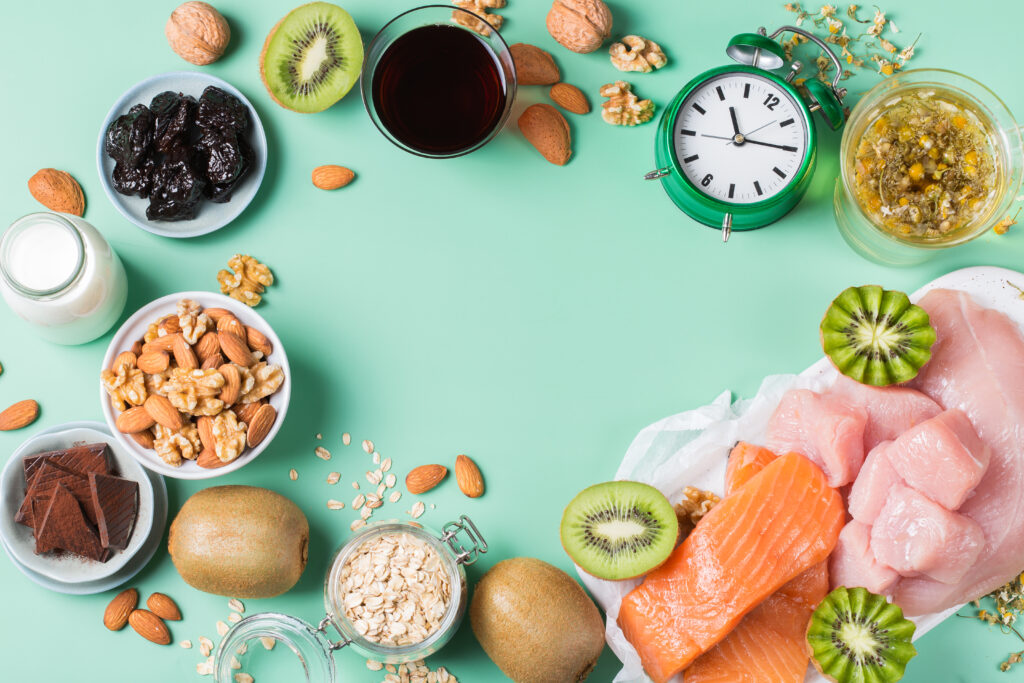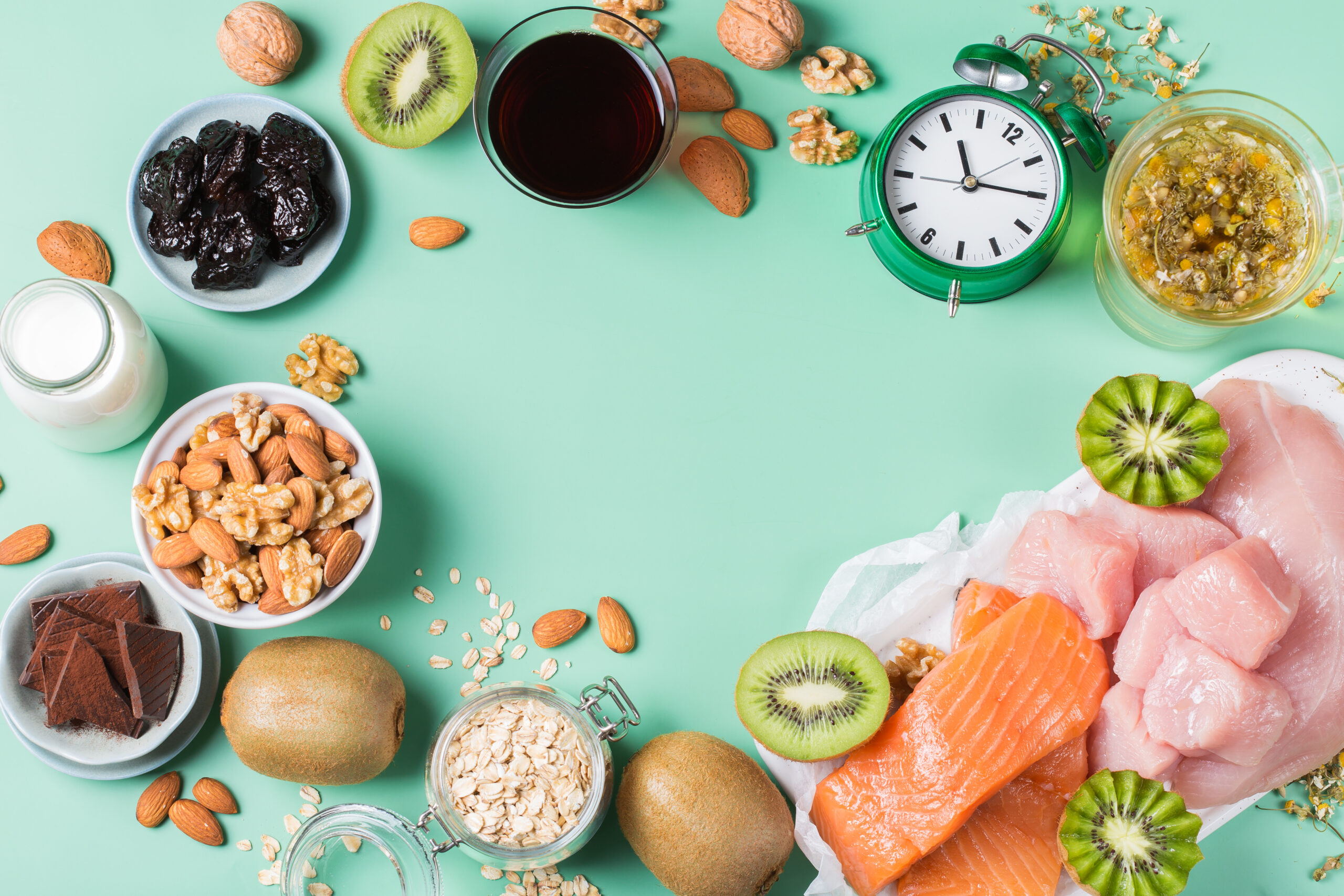Introduction
Sleep plays an essential role in our physical and mental health. Yet many people find it difficult to fall asleep, or to enjoy a good night's sleep. While there are many causes for these problems, one factor that is often underestimated is diet. What we eat can directly influence the quality of our sleep.
Some foods can make it easier to fall asleep and improve the duration and quality of rest, while others can disrupt the sleep cycle.
This article explores which foods are best for a good night's sleep, which foods should be avoided before bedtime, and gives you practical advice on how to adopt a diet that promotes restful sleep. Let's find out how to adjust your plate for better sleep!
Why does diet influence sleep?
The role of tryptophan and melatonin
Tryptophan is an essential amino acid that our body cannot produce on its own, and must obtain from our diet. This amino acid plays a key role in the production of serotonin, a hormone that regulates mood and promotes relaxation, as well as melatonin, the hormone responsible for the sleep-wake cycle.
Foods rich in tryptophan, such as turkey, eggs and dairy products, can help you fall asleep. As LaNutrition.frexplains, eating complex carbohydrates in combination with tryptophan-rich proteins can increase its absorption and facilitate melatonin production.
Impact of vitamins and minerals on sleep
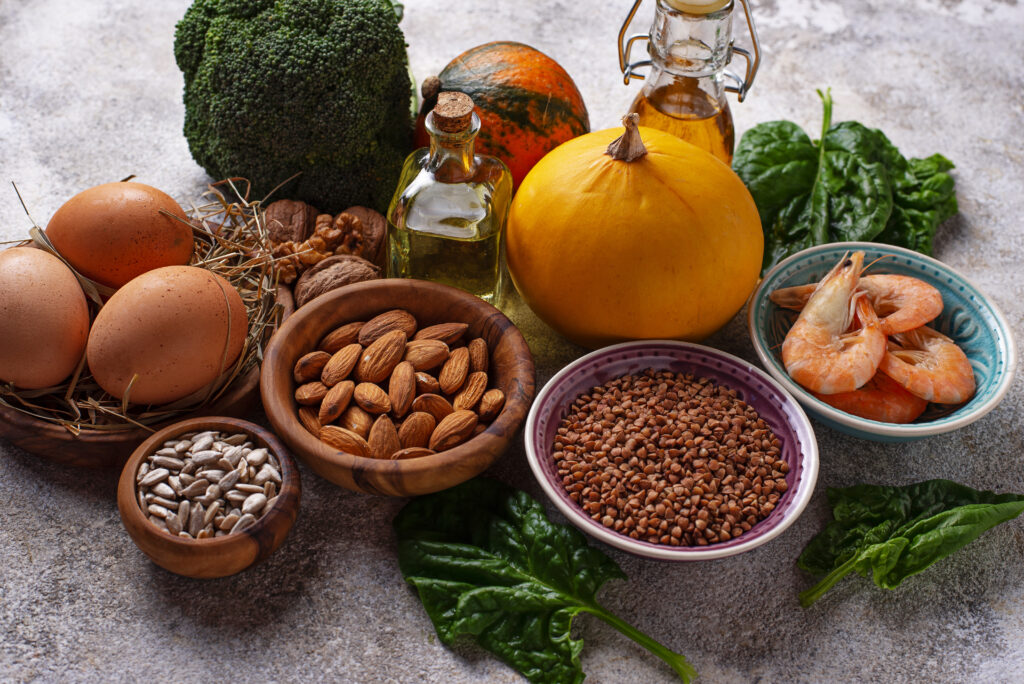
Vitamins and minerals also play a crucial role in sleep quality. For example:
- Magnesium : Known for its relaxing properties, it helps reduce stress and improve sleep quality. It is found in foods such as almonds, cashews and green leafy vegetables.
- Vitamin B6 : Necessary for melatonin synthesis, it is present in salmon, bananas and potatoes.
- Calcium : Aids melatonin production and is found in dairy products and green leafy vegetables.
“The combination of omega-3s and vitamin D found in oily fish such as salmon, tuna, mackerel and trout, can improve sleep quality by increasing serotonin production.”
The importance of meal timing
When we eat is just as important as what we eat. Meals that are too heavy or too light can disrupt sleep. A balanced dinner, taken 2 to 3 hours before bedtime, promotes optimal digestion and peaceful sleep.
INSV recommends complex carbohydrates and light proteins for the evening meal to avoid night-time cravings that could interrupt sleep (INSV).
Foods for a good night's sleep
Tryptophan-rich foods
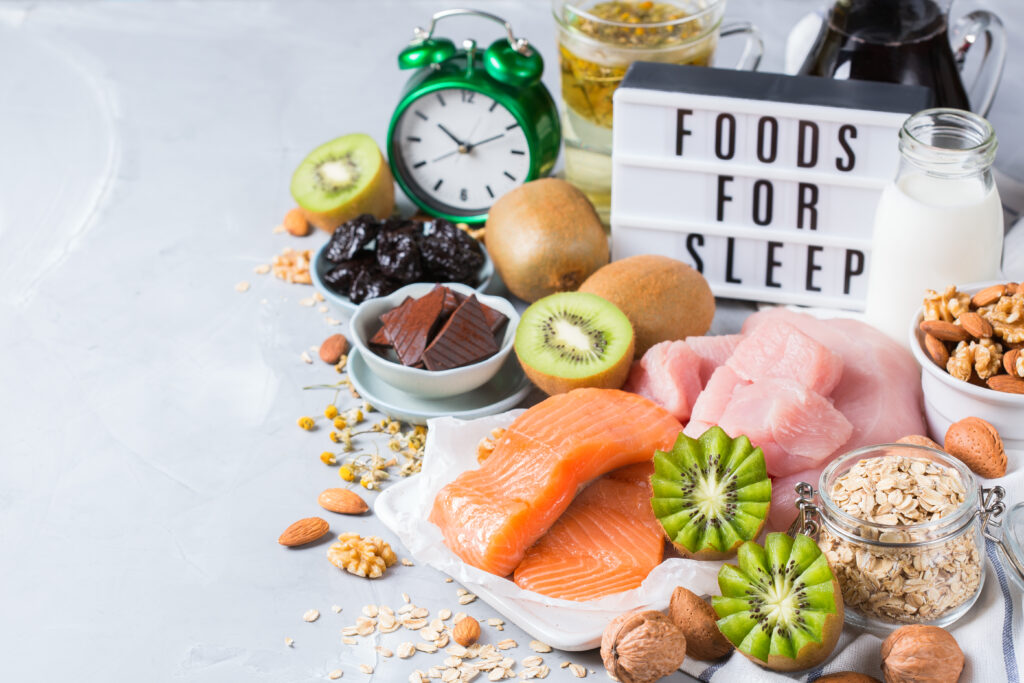
Tryptophan is an essential amino acid that promotes the production of melatonin and serotonin, two hormones involved in sleep. To improve your quality of rest, choose foods containing tryptophan, such as :
- Turkey and chicken : Lean proteins rich in tryptophan.
- Eggs : A complete source of protein and tryptophan.
- Dairy products : Milk, yoghurt and cheese contain tryptophan and calcium, which also contribute to melatonin production.
- Bananas : They contain tryptophan as well as magnesium and potassium, which help muscle relaxation.
Practical tip : Combine these foods with complex carbohydrates (such as brown rice or oatmeal) for better tryptophan absorption.
Oily fish and their role in melatonin production
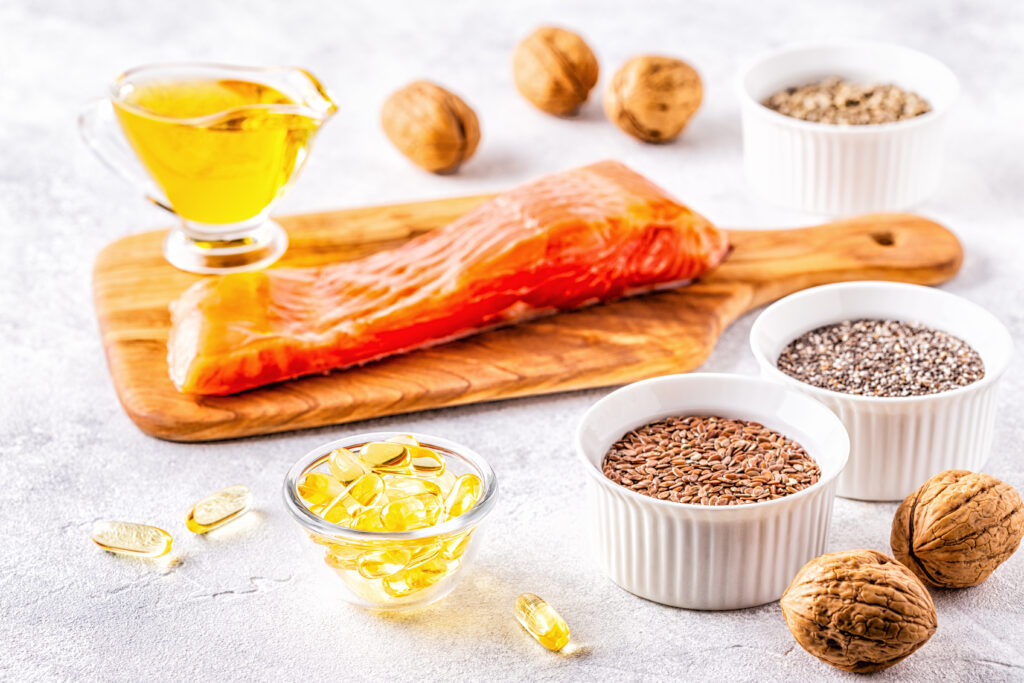
Oily fish such as salmon, tuna, mackerel and sardines are rich in omega-3 and vitamin D, which play a key role in regulating sleep.
According to Santé Magazine“The combination of omega-3s and vitamin D found in oily fish such as salmon, tuna, mackerel and trout, can improve sleep quality by increasing serotonin production.”Santé Magazine).
Complex carbohydrates for restful sleep
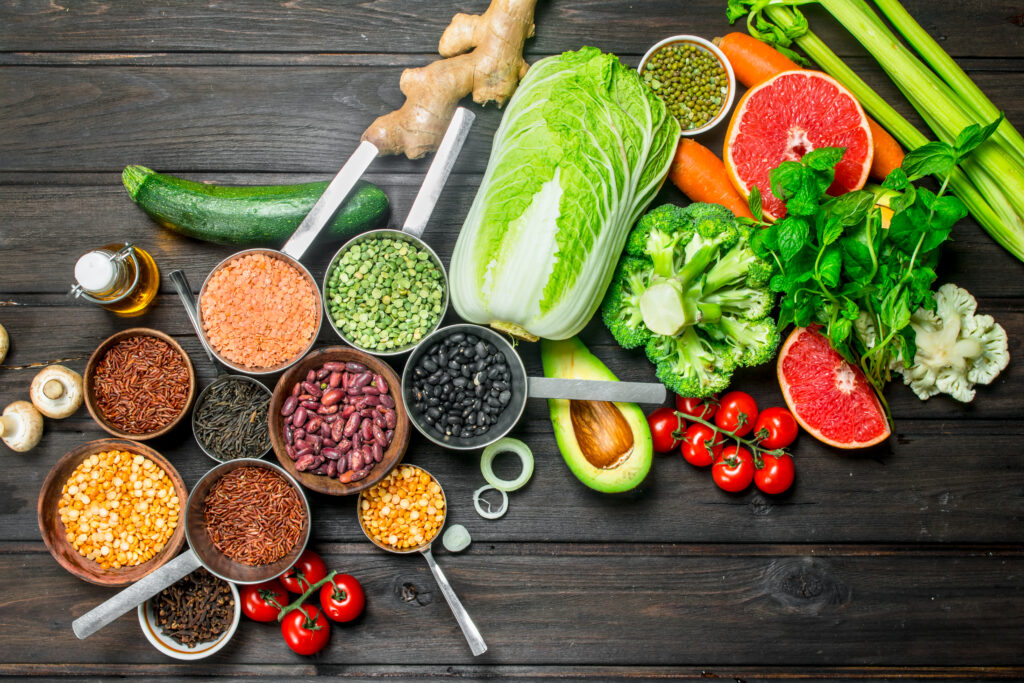
Complex carbohydrates help stabilize blood sugar levels and facilitate the release of tryptophan in the brain. Here are some examples of foods to include in your evening meals:
- Brown rice
- Oat flakes
- Quinoa
- Legumes (lentils, chickpeas)
Institut National du Sommeil et de la Vigilance (INSV) recommends including complex carbohydrates with dinner to avoid night-time cravings (INSV).
Magnesium-rich foods
Magnesium is known for its relaxing properties and helps reduce stress. Include it in your diet:
- Almonds and cashews
- Pumpkin seeds
- Green leafy vegetables (spinach, kale)
Foods and drinks to avoid before bedtime
Caffeine and energy drinks
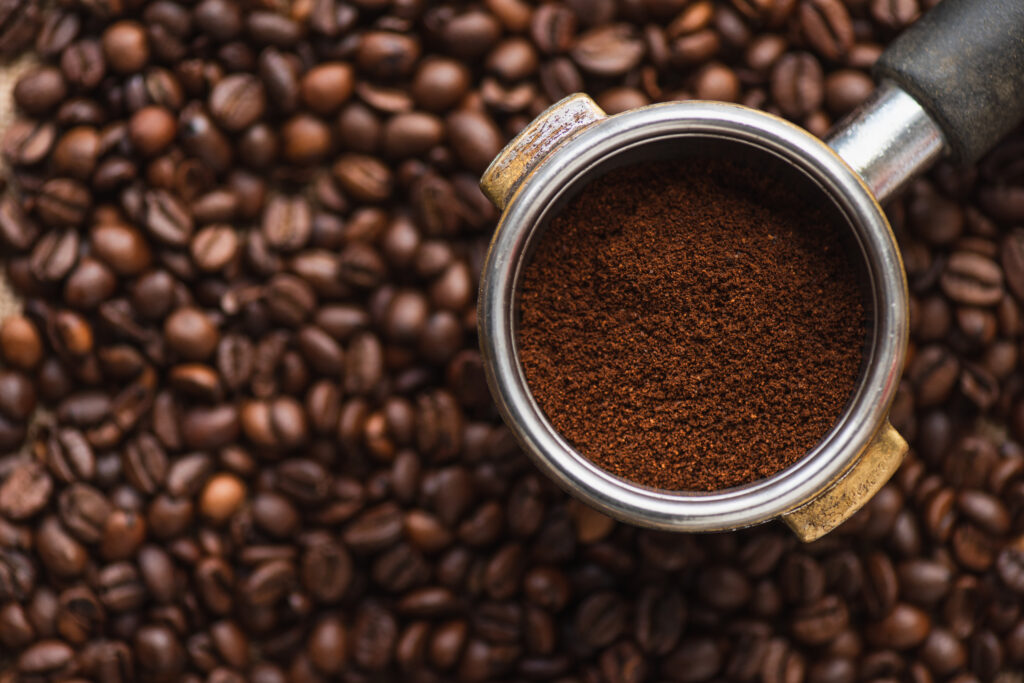
Caffeine is a stimulant that can disrupt sleep and reduce sleep quality. It is found in :
- Coffee
- Black and green tea
- Soft drinks (like cola)
- Energy drinks
TheInstitut National du Sommeil et de la Vigilance (INSV) recommends avoiding these drinks after 2pm. According to Medisite :
“INSV experts remind us that drinks such as coffee, tea, sodas and energy drinks should be avoided after 2pm, as they may interfere with falling asleep.”
Overly spicy meals
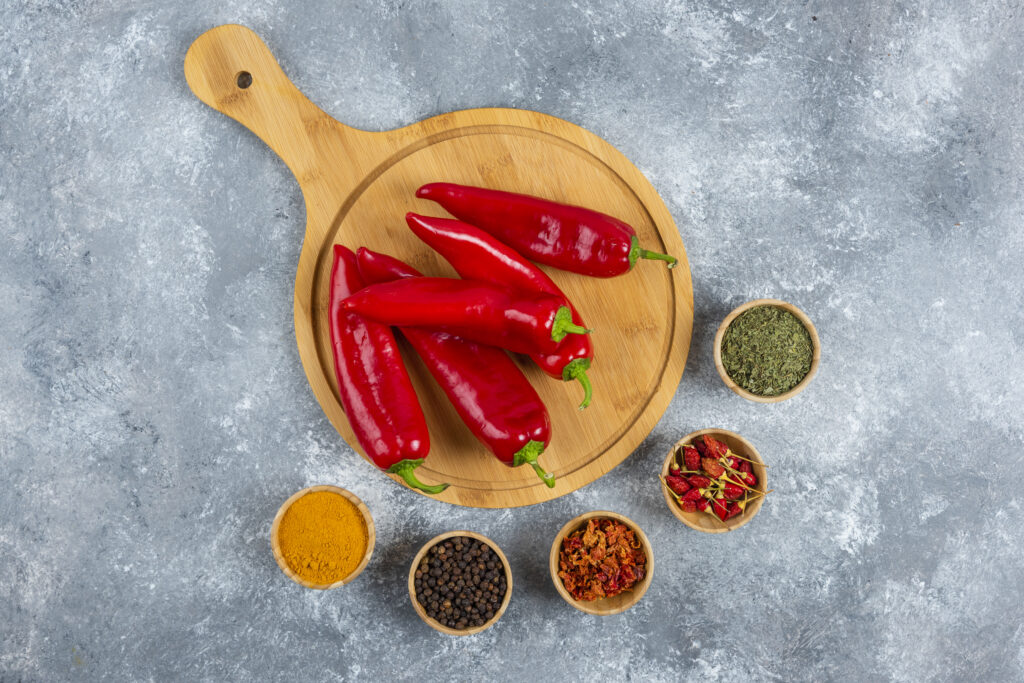
Spicy foods can cause heartburn and disrupt sleep. Indeed, difficult digestion leads to a rise in body temperature, which can prevent you from falling asleep quickly.
Santé Magazine points out that “Overly spicy meals, especially those containing chilli, can delay sleep and cause night-time awakenings.” (Santé Magazine).
Saturated fats
Meals rich in saturated fats (fried foods, deli meats, fast food) can slow digestion and cause night-time awakenings.
Alcohol

Although alcohol can make you feel drowsy, it disrupts deep sleep cycles and increases night-time awakenings. It is therefore advisable to limit alcohol consumption, especially in the evening.
Sugar and processed foods
Sugar-rich foods raise blood glucose levels, which can lead to energy peaks and disrupt sleep.
- Examples : Sweets, pastries, sweet drinks.
Practical tips for a sleep-inducing diet
Plan your meals for optimal sleep

The timing of your meals is as important as their content. To promote restful sleep, adopt these good practices:
- Eat dinner 2 to 3 hours before bedtime : This gives your body time to digest before going to sleep.
- Eat a light, balanced dinner : Avoid heavy meals, which can weigh down digestion and disrupt sleep.
- Add complex carbohydrates and light proteins : For example, a portion of brown rice with chicken or salmon.
- Avoid sugar and saturated fats in the evening : : They can cause energy peaks and night-time awakenings.
Daily eating habits

- Avoid caffeine after 2 p.m. : Coffee, black tea and soft drinks can remain active in your system for several hours.
- Moisturize moderately in the evening : Excessive water consumption at the end of the day can lead to waking up at night to go to the toilet.
- Incorporate relaxing snacks if necessary : A small handful of almonds or plain yoghurt can help calm hunger pangs without interfering with sleep.
Practical tip : A glass of warm milk with a spoonful of honey is a traditional drink known to promote relaxation and sleep.
The influence of intestinal microbiota on sleep

The intestinal microbiota, often referred to as the “second brain”, plays a fundamental role in regulating our sleep. It's made up of billions of bacteria that influence the production of neurotransmitters such as serotonin, essential for sleep.
The link between microbiota and sleep
Studies have shown that the balance of the intestinal microbiota directly influences the sleep-wake cycle. A healthy intestinal flora promotes the production of serotonin, which is then converted into melatonin.
RFI, explains that recent research shows that diet quality and a well-balanced intestinal microbiota contribute to better quality sleep. (RFI)
Foods for a healthy microbiota
To take care of your microbiota and improve your sleep, focus on :
- Fermented foods : Yogurt, kefir, sauerkraut, kimchi.
- Prebiotic fibres : Oats, bananas, leeks, asparagus.
- Natural probiotics : Food supplements on medical recommendation.
By maintaining a balanced microbiota, you optimize your chances of restful sleep and better overall health.
Conclusion
Diet plays a crucial role in the quality of your sleep. By choosing foods rich in tryptophan, magnesium and omega-3s, you naturally promote the production of melatonin and serotonin, two essential hormones for rest. Similarly, avoiding stimulants such as caffeine, overly spicy meals and saturated fats helps you to fall asleep more quickly and stay asleep longer.
Adopting a balanced eating routine, planning your meals strategically, and taking care of your microbiota can transform your nights and improve your overall well-being. According toINSV :
“A balanced diet that includes foods that promote good sleep can help you achieve the recommended number of hours of sleep.”
(IG.ca).
For optimal monitoring of your sleep and better management of disorders such as sleep apnea, discover Apnolab. This innovative platform centralizes your sleep data, facilitates treatment monitoring and supports you on a daily basis to improve your quality of life. Whether you're a patient or a healthcare professional, Apnolab offers you advanced remote monitoring and analysis tools for more peaceful nights.

